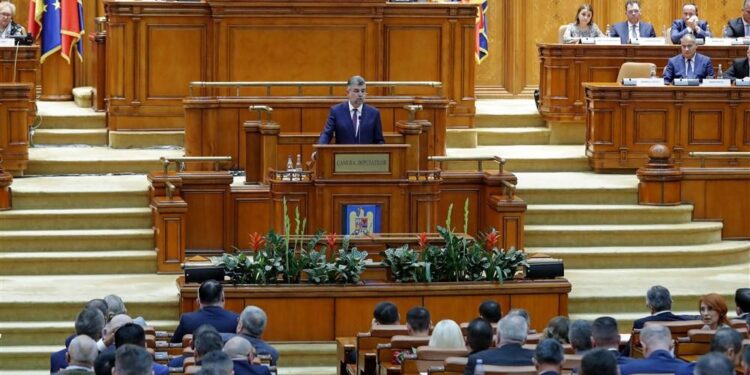BUCHAREST – The Romanian government narrowly survived a no-confidence vote on Tuesday, solidifying its hold on power amid mounting economic challenges. Despite fierce opposition from rival parties, the ruling coalition succeeded in passing controversial tax increases aimed at shoring up public finances. The developments mark a critical juncture for Romania’s political landscape and economic policy as the administration seeks to balance fiscal responsibility with growing public discontent.
Romanian Government Endures No Confidence Challenge Amid Political Turmoil
The Romanian government narrowly avoided a political setback after surviving a no confidence vote that highlighted the growing tensions within the ruling coalition. Opposition parties rallied behind the motion, citing governance inefficiencies and the controversial introduction of tax hikes as key reasons for challenging the current administration. Despite vocal criticism and street protests, the executive branch maintained solidarity, signaling its resolve to implement the fiscal reforms deemed necessary to stabilize the country’s economy.
Among the measures pushed through by the government are:
- Increased VAT rates on select luxury goods and services
- Higher income tax brackets targeting top earners
- New levies on digital and financial transactions
Critics argue that these tax hikes may exacerbate inflation and burden the middle class, but officials claim they are vital for reducing the national deficit and funding public investments. The political confrontation underscores a broader struggle to balance economic reforms with social stability in an increasingly polarized environment.
| Tax Measure | Previous Rate | New Rate |
|---|---|---|
| VAT on Luxury Goods | 19% | 24% |
| Top Income Tax Bracket | 16% | 22% |
| Financial Transaction Levy | 0.1% | 0.3% |
Implications of New Tax Hikes on Economy and Public Sentiment
The recent tax hikes pushed through by the Romanian government have sparked immediate concerns among economists and citizens alike. The measure, intended to stabilize fiscal deficits and bolster public revenue, has ignited fears of slowed economic growth as businesses brace for higher operational costs. Experts warn that increased taxation on key sectors might lead to reduced investment and potentially dampen consumer spending, affecting the overall economic momentum. Public sentiment, meanwhile, reflects growing unease, with many perceiving the hikes as a burden on the middle class and small enterprises.
Key anticipated impacts include:
- Rise in consumer prices, particularly in essentials.
- Potential slowdown in foreign investment inflows.
- Increased operational expenses for SMEs.
- Heightened public dissatisfaction and protests.
| Sector | Tax Increase (%) | Projected Impact |
|---|---|---|
| Retail | 3.5 | Higher consumer prices |
| Manufacturing | 4.0 | Lower profit margins |
| Technology | 2.5 | Reduced R&D investment |
Policy Recommendations for Balancing Fiscal Growth and Social Stability
To ensure sustainable fiscal growth while maintaining social tranquility, the government must implement a carefully calibrated mix of revenue measures and social protections. Progressive tax reforms that target higher-income brackets and corporations can augment state coffers with minimal impact on lower-income populations. Simultaneously, expanding targeted social spending on healthcare, education, and unemployment benefits will help cushion vulnerable groups from potential economic shocks triggered by rising taxes. Transparency in the allocation of increased revenues coupled with consistent dialogues between policymakers, unions, and civil society will be critical to building public trust and avoiding further unrest.
Policy effectiveness can be further enhanced by adopting a multi-pronged approach that integrates economic stimulus with fiscal responsibility. For example, investment in infrastructure and innovation should be prioritized to drive productivity and job creation without exacerbating deficits. Below is a simplified framework for balancing these competing demands, illustrating key strategic priorities:
| Policy Focus | Key Actions | Expected Outcome |
|---|---|---|
| Taxation | Implement progressive hikes, close loopholes | Increased revenue, equity in tax burden |
| Social Protections | Boost healthcare & social welfare programs | Shield vulnerable, enhance social stability |
| Economic Growth | Invest in infrastructure and innovation | Job creation, long-term productivity gains |
| Governance | Increase transparency & stakeholder engagement | Elevated public trust, reduced conflict |
Future Outlook
As the Romanian government narrowly survives the no confidence vote, it moves forward with its contested tax hikes amidst growing public discontent. The developments signal a turbulent period ahead for Romania’s political landscape, with opposition parties vowing continued resistance and citizens bracing for the economic impact. Reuters will continue to monitor the evolving situation.
















